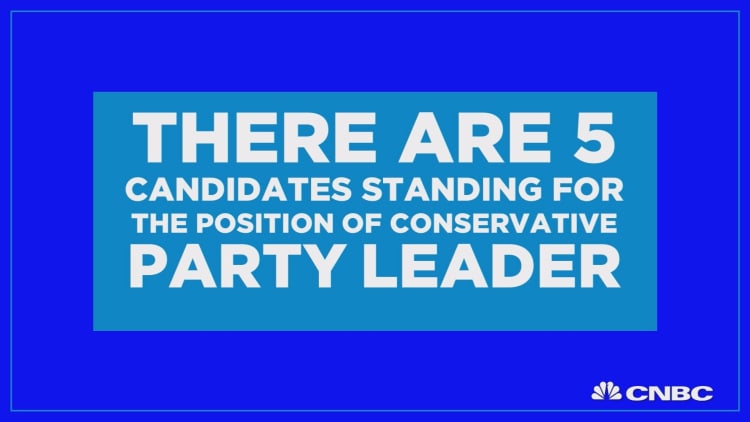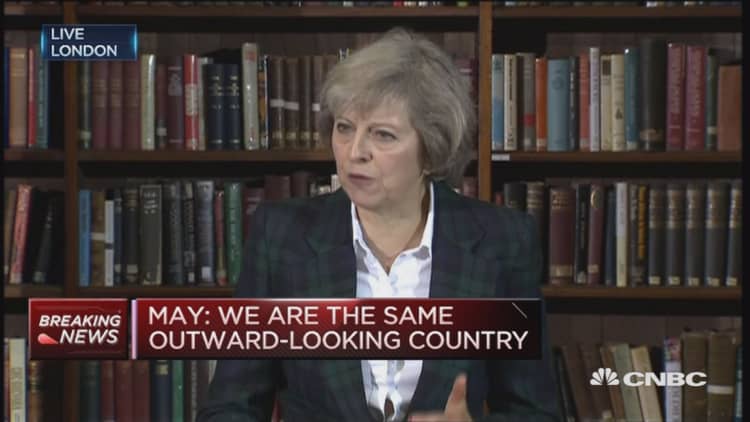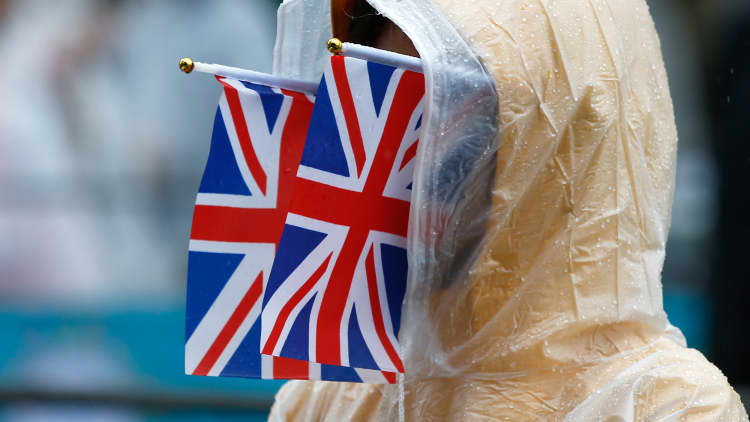


British Home Secretary Theresa May won the first round of voting to decide a successor to Prime Minister David Cameron, the Conservative Party said on Tuesday, as former defense secretary Liam Fox was eliminated from the contest.
May was one of the only candidates that did not campaign for Britain to leave the EU.
The vote among Conservative lawmakers saw interior minister May win 165 votes. Energy Minister Andrea Leadsom, once a debt trader at Barclays, came in second with 66 votes. Defense Secretary Michael Gove was in third with 48 votes.
Work and Pensions Secretary Stephen Crabb won 34 votes, putting Fox in last place on 16 and ending his leadership bid.
Late Tuesday, Crabb pulled out of the race and endorsed front-runner May as the list of candidates was reduced to three.
"I'll be lending my wholehearted support to Theresa May," Crabb said, describing her as the only candidate who could unite the party and lead a strong and cohesive government.
Process of elimination
The contest, triggered by Cameron's decision to resign following the June 23 public vote to leave the European Union, is decided by a series of ballots among Conservative lawmakers to whittle the field down to two.
Although Cameron remains the de facto leader of the party until a final party-wide vote is taken and a winner announced (expected to be on September 9) his resignation has opened up something of a power vacuum in the party and divisions over whether the new leader — who will have to negotiate Britain's tricky exit from the EU — will be from the remain or leave camp.
A second vote will be held on Thursday and yet again next Tuesday, eliminating two more candidates. As such, by next Tuesday (unless anyone pulls out of the race beforehand) we will know the two remaining candidates that will face a final vote by the entire Conservative party membership.
Rabobank analysts Richard McGuire, Lyn Graham-Taylor and Matt Cairns summarized the stances of each of the candidates in a note on Tuesday.
"Broadly speaking, Energy Minister Leadsom and former Defense Secretary Fox have called for quick negotiations in order to keep the period of uncertainty as short as possible," they noted.
"The other three candidates — May, Gove and Crabb — have expressed their preferences for a more cautious approach. The candidates also differ substantially in their views on the desired outcome of the negotiations (for example, access to the EU single market and free movement of people)."
More uncertainty
The analysts noted that when the ballots are counted later on Tuesday, "we should therefore be able to cross out one of the five scenarios for British strategy for the negotiations" but they cautioned that more uncertainty lies ahead.
"Even after this first elimination, we may still be left with four very distinct approaches the future U.K. Prime Minister may have when he or she sits down at the negotiating table. Uncertainty is therefore unlikely to fade until there is clarity about who will be at the helm of the U.K. in a few months' time. "
Uncertainty is not expected to end once a new leader is in place either. Cameron has said he will not trigger Article 50 of the Lisbon treaty, which starts the withdrawal process from the EU, and a new leader will have to choose if and when the right moment to set the ball rolling.
Other EU leaders have called on the U.K. to not delay the process in a bid to limit uncertainty, but many among the 48 percent of voters who chose to remain have taken comfort from the fact that a Brexit has not started yet and hope that a last-minute solution could be found to stop the divorce.
Likewise, prominent members of the Brexit campaign have distanced themselves from promises made up to the referendum leaving many "leave" voters angry.

Questions over the legitimacy of any new Tory leader to become what is effectively an unelected prime minister have also prompted speculation over whether an early general election could take place later this year.
Alastair Newton, co-founder and director at Alavan Business Advisory, said in a note on Tuesday that an election later this year was unlikely but that a "pro-EU majority in the (House of) Commons could force an election by this time next year." He put the probability of an election by mid-2017 at 55 percent.
Follow CNBC International on Twitter and Facebook.
— Reuters contributed to this report.


